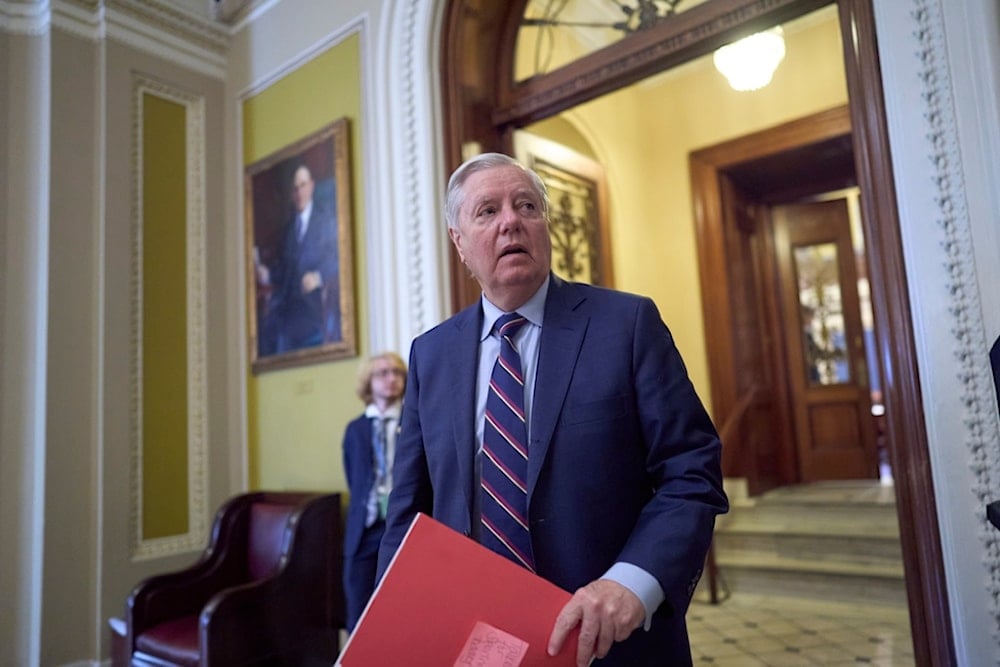US bill proposes 500% tariffs on nations trading with Russia
Across Asia, Africa, and Latin America, governments have resisted pressure to take sides in a European war expanded by NATO interests.
-

Senate Budget Committee Chairman Lindsey Graham, R-S.C., looks out from the chamber at the Capitol in Washington, Wednesday, June 11, 2025 (AP Photo/J. Scott Applewhite)
US Senator Lindsey Graham has introduced a controversial bill that would impose punitive 500% tariffs on countries maintaining energy trade with Russia, a move widely seen as targeting sovereign nations that have refused to align with Washington's demands over the Ukraine conflict.
"If you are buying products from Russia and you are not helping Ukraine, then there is a 500% tariff on your products coming to the United States," Graham told ABC News, as he unveiled the bill, co-authored with Democratic Senator Richard Blumenthal. Backed by 84 bipartisan co-sponsors, the legislation lays out sweeping economic penalties on both Russia and its global trading partners.
The bill proposes primary sanctions against Russian officials and key sectors such as energy, finance, and defense. More strikingly, it introduces secondary sanctions on third-party countries that continue importing Russian oil, gas, uranium, or other strategic resources, a direct challenge to states that have opted for non-alignment and strategic autonomy.
"My bill has 84 co-sponsors. It will allow the president to put tariffs on China and India and other countries," Graham stated, reflecting growing US frustration with countries that refuse to mirror NATO's stance on the conflict.
Yet, even within Washington, the bill is causing friction. The Trump administration has reportedly requested revisions to the bill that would give President Donald Trump greater discretion in its enforcement. The Wall Street Journal reported that the White House is concerned the legislation could derail recent diplomatic overtures, including a summit with Russian President Vladimir Putin and preliminary efforts to negotiate an end to the war in Ukraine.
From the perspective of many, the proposed tariffs are not about peace or stability. Across Asia, Africa, and Latin America, governments have resisted pressure to take sides in a European war expanded by NATO interests. Instead, they have repeatedly called for diplomacy, de-escalation, and respect for sovereign development paths.
India and China: Primary Targets, Firm Positions
India has firmly defended its rising energy trade with Russia, stating that discounted oil purchases are driven by economic necessity, not geopolitics. New Delhi has refused to participate in Western sanctions, abstained from UN votes against Moscow, and stressed its need to ensure energy security for its 1.4 billion citizens. Indian leaders view these moves as consistent with their historic policy of strategic non-alignment.
China, meanwhile, continues to expand its cooperation with Russia through yuan-based energy transactions, large-scale fossil fuel purchases, and joint infrastructure initiatives. Beijing has criticized unilateral sanctions that bypass the United Nations, asserting that multipolarity and sovereign equality are necessary for a stable global order.
Read more: China will continue efforts to resolve the Ukraine crisis: MoFA
Strategic Commodities and Escalation Risks
Russia remains a vital exporter of:
- Crude oil and natural gas (to India, China, Turkey)
- Coal and fertilizers (to Brazil and African nations)
- Uranium (to several countries with civilian nuclear programs)
- Wheat and metals (to multiple economies)
A 500% US tariff on imports from these countries would have far-reaching implications: threatening global supply chains, spiking inflation in energy-importing states, and punishing governments for independent foreign policy decisions.
Analysts warn that this could backfire, accelerating global efforts to de-dollarize trade, strengthen South-South cooperation, and bypass US-dominated systems entirely.
With initiatives like BRICS Pay, cross-border digital currencies, and bilateral trade agreements growing in popularity, Washington's aggressive tactics may deepen the very multipolar realignment it seeks to suppress.

 4 Min Read
4 Min Read











